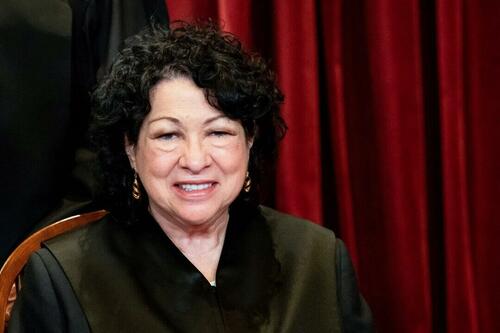
Authored by Sam Doorman via The Epoch Times,
The Supreme Court ruled unanimously that the National Rifle Association plausibly alleged that the administration of the state of New York violated the First Amendment by pressuring insurance companies to cut ties with the gun rights organization.
The case, NRA v. Vullo, emerged out of the aftermath of the Parkland shooting on Feb. 14, 2018.
“A government official can share her views freely and criticize particular beliefs, and she can do so forcefully in the hopes of persuading others to follow her lead,” Supreme Court Justice Sonia Sotomayor wrote in the majority opinion.
Justices Neil Gorsuch and Ketanji Brown Jackson filed concurring opinions.
“In doing so, she can rely on the merits and force of her ideas, the strength of her convictions, and her ability to inspire others. What she cannot do, however, is use the power of the State to punish or suppress disfavored expression,” Justice Sotomayor added.
The U.S. Court of Appeals for the Second Circuit had rejected the NRA’s First Amendment arguments and said that regardless, New York Department of Financial Services Superintendent Maria Vullo was entitled to qualified immunity.
David Cole, who argued for the NRA on March 18, maintained that New York state engaged in a type of coercive activity that violated the First Amendment.
“This was not about enforcing insurance law or mere government speech,” Mr. Cole said.
“It was a campaign by the state’s highest political officials to use their power to coerce a boycott of a political advocacy organization because they disagreed with its advocacy.”
The U.S. solicitor general’s office similarly argued that Ms. Vullo’s conduct, and former New York Gov. Andrew Cuomo’s communications, showed that the state was engaging in coercion prohibited under the First Amendment.
Neal Katyal, who argued for Ms.Vullo, said the state targeted the NRA based on illegal insurance products and therefore was justified in telling companies to cease its work with them.
Authored by Sam Doorman via The Epoch Times,
The Supreme Court ruled unanimously that the National Rifle Association plausibly alleged that the administration of the state of New York violated the First Amendment by pressuring insurance companies to cut ties with the gun rights organization.
The case, NRA v. Vullo, emerged out of the aftermath of the Parkland shooting on Feb. 14, 2018.
“A government official can share her views freely and criticize particular beliefs, and she can do so forcefully in the hopes of persuading others to follow her lead,” Supreme Court Justice Sonia Sotomayor wrote in the majority opinion.
Justices Neil Gorsuch and Ketanji Brown Jackson filed concurring opinions.
“In doing so, she can rely on the merits and force of her ideas, the strength of her convictions, and her ability to inspire others. What she cannot do, however, is use the power of the State to punish or suppress disfavored expression,” Justice Sotomayor added.
The U.S. Court of Appeals for the Second Circuit had rejected the NRA’s First Amendment arguments and said that regardless, New York Department of Financial Services Superintendent Maria Vullo was entitled to qualified immunity.
David Cole, who argued for the NRA on March 18, maintained that New York state engaged in a type of coercive activity that violated the First Amendment.
“This was not about enforcing insurance law or mere government speech,” Mr. Cole said.
“It was a campaign by the state’s highest political officials to use their power to coerce a boycott of a political advocacy organization because they disagreed with its advocacy.”
The U.S. solicitor general’s office similarly argued that Ms. Vullo’s conduct, and former New York Gov. Andrew Cuomo’s communications, showed that the state was engaging in coercion prohibited under the First Amendment.
Neal Katyal, who argued for Ms.Vullo, said the state targeted the NRA based on illegal insurance products and therefore was justified in telling companies to cease its work with them.
Loading…





